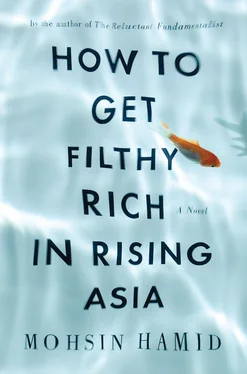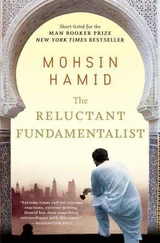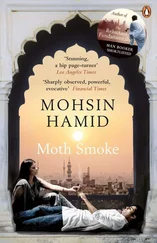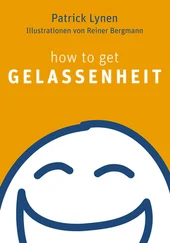You know better than to argue.
In the evenings you ride your bicycle to your home, staying with your parents until it is time for them to attempt to sleep. You do not wish to burden them with the costs of your meals, so you continue to board at the hostel, and besides, your membership of the organization is an occupation for which you are paid, if modestly, and on which your performance is assessed. Now in particular it is important that you be seen to be doing your job well. You attend meetings, read the organization’s literature, and keep your eyes and ears open, as you have been instructed to do. But your thoughts wing their way to your mother.
Later that week you have the good fortune of again catching a group of students furtively smoking hash in a shed behind the space sciences building. You inform your leader, who tells you to accompany him to the scene. As you walk he looks around pleasantly at the plum-headed green parrots chattering in the treetops. You suspect he is carrying his gun.
He greets the smokers. There are five of them and two of you, but they appear very frightened.
“This is not good, my brothers,” your leader says.
“What, sir?” one of them asks. He is a lanky fellow with sideburns and a soul patch, his T-shirt suggesting an affinity for heavy metal.
Your leader cuffs him across the face and continues without raising his voice, “These drugs are forbidden. They will make you weak. You’re intelligent boys. You should know that.”
All five nod vigorously.
Your leader spreads his arms. “This won’t happen again?”
He is assured that it will not.
The following day your leader gives you the details of a clinic. It is just outside the city, or at least outside what is currently thought of as the city, even though roadside urbanization links its location to the metropolis like the arm of an octopus. You and your mother journey there by bus. The clinic is a low building, almost equal in footprint but not in height to the place of worship that sits beside it. Its clientele is poor, and it utterly lacks the computers and air-conditioning, or for that matter the clean walls and floors, of the private hospital.
The doctor you are taken to see examines your mother quickly, looks at her test results, and shakes his head. “We can’t help her,” he says to you.
“You don’t treat cancer?”
“Sometimes. Surgically. But we don’t administer hormones or radiotherapy.”
“What should we do?”
“You should pray. It’s out of your hands. The thyroid has been removed. She might be fine.”
Your mother is quiet throughout, as she tends to be in her interactions with medical professionals. They are unusual in their capacity to cause this behavior in her. Their power to kill in the future by uttering mysterious words today robs her of her confidence and she, a customarily confident woman, resents this. She longs to resist them but has no idea how to do so.
For a time, your mother’s condition seems neither particularly good nor bad. The wound of the surgery heals, darkening and puckering under its protective dressing of gauze. She endures headaches stoically, refusing for the most part to admit to them but unable entirely to mask in her eyes signs of the discomfort they cause. She also has muscular twitches, little spasms thrusting beneath her shawl like fish feeding below the surface of a pond. You recognize these from your online investigations at the university computer center as being symptoms of her thyroid hormone deficiency.
Eventually your father beseeches his employer for further assistance. But the matriarch explains to him that life is one long series of illnesses, that she has intervened to save his wife, successfully and at great expense, but cannot be asked to keep intervening, again and again, for where would it stop, she is not made of money, and in the end, as she knows only too well herself, certain things are up to fate, and we can struggle, but fate is fate, so it would be best for him and his family to do what they can, since it is after all their responsibility, and to accept that she has already helped them more than anyone could reasonably have expected that she would.
In the coming months your mother’s suffering is extreme, her cancer having metastasized to her bones and lungs. This is accompanied by a transformation in her appearance and personality. She is gripped by fear, surprised both by her unyielding attachment to life and by the failure of her imagination to conceive of a proud ending to it. Her death, in the absence of modern palliative care, is preceded by agony, only partially mitigated in her final fortnight by street heroin procured by your brother and administered by your father through slender, long-filtered women’s cigarettes, from which your mother, wheezing, attempts to inhale in tiny gasps.
Your sister arrives from the village to comfort her. Neither woman has previously thought of your sister as your mother’s favorite, that honor being yours, but it is to your sister that your mother turns most naturally at this time, perhaps because she is her eldest, or because they are both women, or because your sister is the only one of her children to herself be a mother, and in your sister your mother perceives echoes of her own mother, whom she last saw the same age your sister is now, when your mother was a little girl. In the moment she ceases to live, your sister is holding your mother’s hands, your mother like an infant struggling to take its first breath as it transitions from aquatic life to terrestrial, but in reverse, with her lungs filling with water, and the breath never coming.
As you and the men of your family carry her white-shrouded body on your shoulders to the open, dusty pit of her grave, you are struck by how light she is. The speed of her progression from solid heartiness to ephemeral fragility has been so strange as to be almost fantastic. Rose petals are thrown, incense lit, entreaties to the divine offered, and then those of you still living return to your lives.
At the university, members of your organization urge you not to mourn too much or for more than the prescribed period. They say that to do otherwise is to reject what fate has decreed. Instead they tell you to focus your energies on the tasks you are assigned, to recognize your comrades as your true family, and to act through the organization to fulfill your destiny as your mother has fulfilled hers. But these suggestions strike you as scripted and uncompelling, and moreover in your current introspective and melancholy state your appetite for the food, clothing, and belonging that the organization offers, and for the protection that it claims to offer, is significantly diminished.
Your leader begins to watch you, then tells those he trusts most among your comrades to watch you as well. He is troubled by your apathy and listlessness, by the note of cynicism you inject into conversations and meetings. You are careful never knowingly to provoke him, but he is aware of the negative influence you have begun to assert when you think him out of earshot. It does not take him long to gather evidence sufficient to issue you with a stern and possibly, given his volatility, painful reprimand, but when he dispatches his deputy to bring you to him, you are nowhere to be found.
Your father has taken your mother’s passing hard, but has refused to accompany your sister back to the village or to stay for a time with your brother. He instead continues with his job, traveling to the matriarch’s residence in the mornings and returning home at night. It is not your intention, when you move in with him, to stay permanently, yet as the days go by you show no interest in resuming your studies, and after a while you begin to hunt for a job.
One afternoon, as you ride your bicycle in pursuit of employment, you glimpse what you think is a familiar face in a small battered car stopped at a red light. You look closely and are certain that yes, it is the pretty girl. She rides in the driver’s seat, alone, her face covered with thick makeup from a shoot. You smile and wave, but she does not see you, or if she does, then she does not recognize you, and when the light changes she careens off on her way.
Читать дальше












